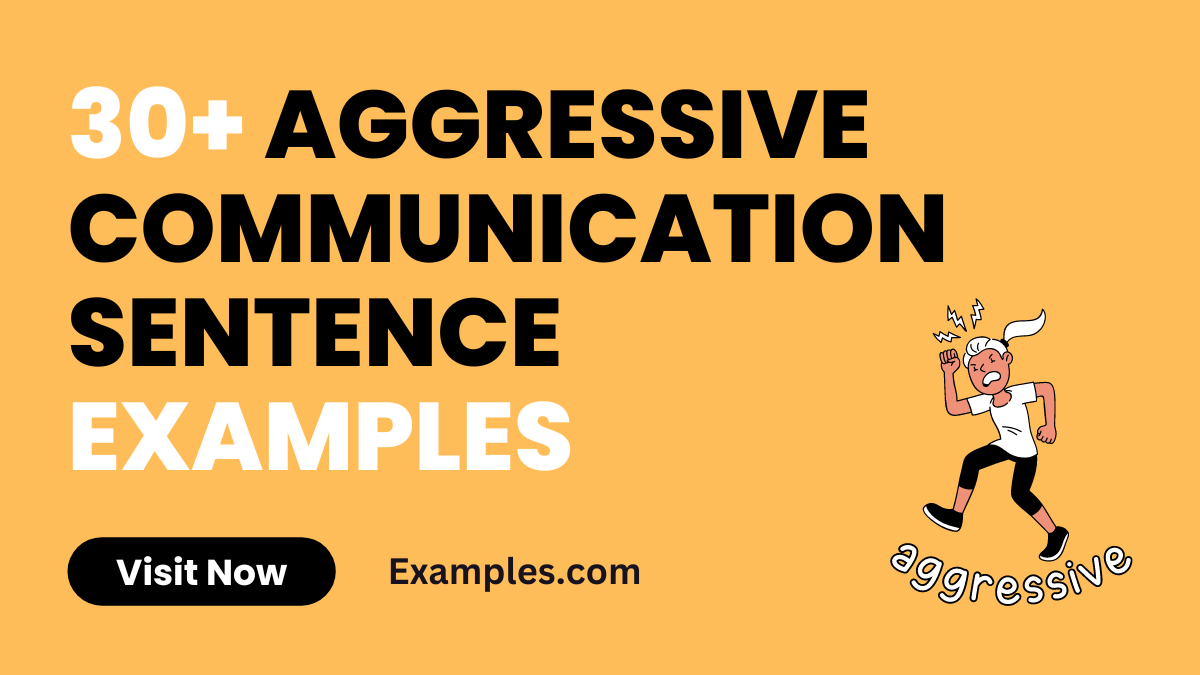29+ Aggressive Communication Sentence Examples
Delve into the dynamics of aggressive communication with our detailed guide, brimming with practical examples. This guide contrasts aggressive communication with Aggressive communication examples, providing a comprehensive understanding of both ends of the communication spectrum. Learn to identify aggressive sentences, understand their impact, and explore ways to address them effectively. Our guide, enriched with real-world examples, is an invaluable resource for anyone looking to navigate the complexities of aggressive communication in various settings, from personal relationships to professional environments.
What is an Aggressive Communication Sentence? – Definition
An Aggressive Communication Sentence is a form of expression that conveys messages in a forceful, often domineering, and confrontational manner. This type of communication is characterized by directness that crosses the line into disrespect, often involving verbal attacks, blame, and criticism. It lacks the empathy and consideration found in more balanced communication styles. Typical of aggressive communication styles, these sentences can lead to conflicts and are detrimental to building healthy relationships, whether in personal interactions or workplace communication.
What is an Example of an Aggressive Communication Sentence?
An example of an aggressive communication sentence is, “You never do anything right; you’re completely useless at this job!” This statement is overtly confrontational, demeaning, and accusatory, making it a clear case of aggressive communication. It not only criticizes the recipient’s abilities but also generalizes their behavior in a negative way. Such sentences are often counterproductive, leading to resentment and defensive reactions rather than constructive dialogue. They are typical in environments where aggressive communication methods, like blaming and verbal abuse, are prevalent.
30 Aggressive Communication Sentence Examples
Aggressive communication often manifests in sentences that are harsh, confrontational, and dismissive. This section provides 30 distinctive examples of Aggressive Communication Sentence Examples, shedding light on the various forms this communication style can take. From verbal attacks to blaming and intimidation, these examples illustrate how aggressive sentences can negatively impact interactions. Understanding these examples is crucial for recognizing aggressive communication in daily life, be it in the workplace, relationships, or other social settings. This awareness can also aid in adopting more effective communication strategies.
- “If you had any brains, you wouldn’t have made such a stupid mistake.”: This sentence belittles the person’s intelligence and abilities, making it a direct verbal attack.
- “I don’t care what you think, just do what I say!”: Shows complete disregard for the other person’s opinion, typical of an authoritarian and overbearing communication style.
- “You’re always messing things up!”: Generalizes the person’s behavior negatively, creating a hostile environment and reducing their self-esteem.
- “Shut up! I’m talking now!”: A clear example of impatience and interruption in communication, this sentence forcefully silences the other person.
- “You’re just too sensitive to handle real feedback.”: Sarcasm and mockery are used here to invalidate the person’s feelings and to deflect from the aggressive nature of the feedback.
- “It’s all your fault we’re in this mess!”: Blame and accusation are evident in this sentence, avoiding personal responsibility and placing undue pressure on the other person.
- “You better do it, or else!”: This is a form of threatening communication, instilling fear to gain compliance or control over the situation.
- “I don’t have time for your nonsense.”: A dismissive attitude is clear in this statement, devaluing the other person’s concerns or opinions.
- “You’re just too incompetent to understand.”: Insults the person’s capabilities and shuts down any possibility of constructive dialogue.
- “I won’t let you ruin everything with your idiotic ideas.”: Overbearing behavior combined with direct confrontation, this sentence stifles collaboration and creativity.
- “Just get out of my sight, you’re useless!”: Hostile body language is implied in this sentence, creating an atmosphere of fear and disrespect.
- “I’m not interested in your pathetic excuses.”: Shows a lack of empathy and a refusal to understand the other person’s perspective.
- “Do it my way, or don’t do it at all!”: A commanding and demanding tone that leaves no room for input or discussion.
- “You’re a total disappointment.”: A deeply critical and personally attacking statement that can have long-lasting emotional impacts.
- “Keep quiet; adults are talking.”: Patronizing and demeaning, this sentence undermines the person’s maturity and right to speak.
- “You’re lucky to even be here, so don’t push your luck.”: Implies that the person’s position is not secure, creating an environment of instability and fear.
- “Why can’t you do anything right?”: A rhetorical question used as a verbal attack, emphasizing the person’s perceived failures.
- “I don’t need your opinion; I know what’s best.”: Shows arrogance and a refusal to consider other viewpoints.
- “Your work is always subpar.”: A generalization that criticizes the person’s consistent performance without offering constructive feedback.
- “Stop wasting my time with your incompetence.”: Implies that the person’s efforts or abilities are inadequate and burdensome.
- “No one cares about your silly ideas.”: Dismisses the person’s contributions as irrelevant or unworthy of consideration.
- “You’re a joke; no one takes you seriously.”: Undermines the person’s credibility and can have a demoralizing effect.
- “I should have known you’d fail; you always do.”: A discouraging statement that erodes confidence and motivation.
- “Your opinion doesn’t matter here.”: Explicitly devalues the person’s thoughts, making them feel insignificant.
- “You’re the weakest link in this team.”: Singling out and negatively comparing the person to others in a group setting.
- “I don’t have time to babysit you.”: Patronizing and belittling, suggesting that the person is a burden and incapable of working independently.
- “You’ll never be as good as you think you are.”: A demotivating statement that attacks the person’s self-esteem and aspirations.
- “Don’t question me; I’m always right.”: Exhibits a lack of openness to feedback or challenge, asserting superiority over the other person.
- “You’ve been nothing but a disappointment to me.”: A deeply hurtful statement that can damage the person’s self-worth and emotional well-being.
- “You should be grateful I even tolerate you.”: Implies that the person is unworthy, fostering a sense of low self-value and dependency.
Tips for Aggressive Communication Sentence

Navigating the terrain of aggressive communication requires a keen understanding of its impact and strategies for mitigation. Here are key tips for dealing with Aggressive Communication Sentences. Firstly, recognize the signs of aggression in communication, such as verbal attacks and intimidation tactics. Awareness is the first step in addressing and reframing these interactions. Secondly, practice self-control and avoid responding with similar aggression, as this can escalate the situation. Instead, respond with assertiveness, which is a more balanced and respectful form of communication. Additionally, focus on active listening to understand the underlying issues fueling the aggression. Understanding the context, such as aggressive communication in the workplace or in personal relationships, can also be crucial. Lastly, seek to address the root causes of aggression, be it stress, misunderstanding, or frustration, to foster a more constructive and respectful dialogue.
Verbal Aggressive Communication Sentence

Verbal aggressive communication is characterized by sentences that are harsh, accusatory, and often demeaning. Such communication can include direct confrontation, blaming in communication, and being verbally abusive. To identify and address Verbal Aggressive Communication Sentences, it’s important to listen for key elements like raised voices, accusatory language, and a lack of empathy. These sentences often aim to dominate or control the conversation, leaving little room for dialogue or understanding. In addressing verbal aggression, it’s vital to remain calm and not mirror the aggressive behavior. Instead, set clear boundaries and communicate your willingness to have a respectful conversation. If the aggression continues, it may be necessary to remove yourself from the situation and seek support, especially in cases of aggressive communication in relationships or at work. By understanding and properly responding to verbal aggression, individuals can maintain their composure and integrity, while promoting a healthier communication environment.
In conclusion, understanding and navigating aggressive communication is crucial for fostering healthier interactions in both personal and professional settings. Aggressive communication, characterized by confrontational, demeaning, and accusatory sentences, can significantly harm relationships and create a hostile environment. To mitigate the negative impacts of aggressive communication, it’s important to recognize the signs of aggression and adopt more assertive communication techniques. Strategies such as identifying triggers, practicing self-awareness, using “I” statements, focusing on the issue rather than the person, and engaging in active listening are effective in transforming aggressive communication into a more constructive and respectful form??.
Assertive communication, as opposed to aggressive communication, offers numerous benefits. It helps in expressing oneself effectively while respecting the rights and beliefs of others. Assertiveness leads to improved self-confidence, self-esteem, and the ability to create win-win situations. It fosters honest relationships, improves decision-making skills, and enhances job satisfaction. By adopting assertive communication, individuals can effectively express their thoughts and feelings, manage conflicts diplomatically, and maintain healthy interpersonal dynamics??.
In conclusion, this guide on aggressive communication sentences offers valuable insights into identifying, understanding, and effectively responding to aggressive verbal interactions. By applying the provided tips and recognizing the examples, readers can navigate aggressive communication more skillfully, fostering healthier and more respectful dialogues in both personal and professional settings. Understanding aggressive communication is key to transforming potentially harmful interactions into constructive conversations.



